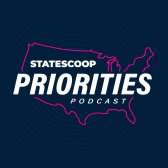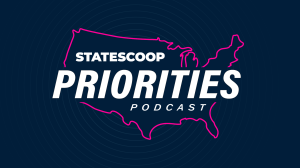
Data analysis, machine learning attract states to the cloud
The ability to analyze data is driving state CIOs to consider cloud computing, especially software-as-a-service products that can help analyze security logs on state networks, state technology thought-leaders say on a new episode of StateScoop’s Priorities podcast.
“We’re definitely seeing the cloud as an opportunity to leverage AI and machine learning and data analytics,” Doug Murdock, Hawaii’s chief information officer, says in the fourth season of Priorities. “We like SaaS applications because cloud-native applications tend to have AI or machine learning built-in.”
Adilson Jardim, an area vice president for Splunk, echoes Murdock’s comments, saying cloud computing positions states for analysis of log data on networks — ultimately making them more secure.
“This is where I think it’s really, really helpful and important to consider cloud not just as an end point in terms of a destination or a function of an application, but rather an enabler of a lot of these emerging technologies and capabilities,” Jardim says. “Log data and log analytics can be really difficult because it really is a manifestation of the big data problem. The volumes are intense, formats and the variety and variability of the data is constantly changing and so is the volume. You’re bombarded with this.”
Splunk produces software to analyze machine data from applications, infrastructure, security software and Internet of Things data.
Ed Toner, Nebraska’s CIO, says that while he sees the value in cloud computing, he remains skeptical of public cloud offerings for his state’s IT delivery.
“I certainly think [emerging tech] is the sweet spot for the cloud,” Toner says on the podcast. “A cloud provider can get you kickstarted in that direction much quicker than having something on-prem. I’m still really looking for that use-case that we can grab hold of here in Nebraska where it could help us. … I’m reading a lot about it, but not seeing a whole lot of it.”
Jardim says for states, though, the conversation remains about finding the right option for their customers.
“We’re seeing [Splunk] customers now trying to evaluate not just which platform and what type of cloud service to leverage, but then also what to do in terms of managing your portfolio across on-prem, hybrid and then into the cloud,” Jardim says. “I think starting with what’s the visibility, what insight do you have into that portfolio? What insight do you have into constituent services?”
On the podcast:
- Ed Toner, chief information officer, Nebraska
- Doug Murdock, chief information officer, Hawaii
- Adilson Jardim, area vice president of sales engineering, Splunk Public Sector
- Jake Williams, associate publisher and director of strategic initiatives, StateScoop and EdScoop
Things to listen for:
- Nebraska shies away from public cloud, Toner says. Instead, the state uses private cloud through Microsoft Azure and a private vendor in Nebraska.
- The role of CIOs is as a “broker and educator” for cloud computing and other information technology services, Murdock says. As CIO, Murdock says he’s encouraging Hawaii agencies to consider cloud for new applications and builds.
- Process-driven applications like human capital management or enterprise resource planning “tend to be a good lift” into cloud environments, Jardim says.
- Murdock says moving to the cloud forces states to “extend our perimeter out” and to be “really smart about the security posture of the cloud.”
- Toner cautions other state CIOs to be wary of the challenges of retrieving data from backups done by cloud vendors in situations where the state customer and the vendor may not know where the data was stored or how that backup could be removed from a cloud server.
Produced in partnership with the National Association of State Chief Information Officers, Priorities dives deep into each of the top 10 priorities of state CIOs outlined in NASCIO’s annual list. This episode is brought to you by Splunk.
Listen to archive episode of Priorities from Season 4 (2019), Season 3 (2018), Season 2 (2017) and Season 1 (2016). Priorities is also available on iTunes.


